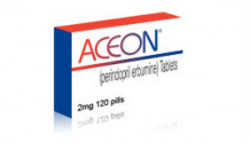Aceon (perindopril) Coupons, Discounts & Cost
Aceon (perindopril) is an ACE inhibitor, which is widely used among different categories of patients with cardiovascular diseases and hypertension. One way to save money on the Aceon (perindopril) retail cost regardless of income and insurance status is to use Aceon (perindopril) coupons or discount cards from RXCoupons. Use our Aceon (perindopril) coupons at your online pharmacy and receive up to 75% off the sale price each time you refill your prescription.
What should patients know about Aceon (perindopril)?
Aceon (perindopril) is an ACE inhibitor, which is widely used among different categories of patients with cardiovascular diseases and hypertension. This medication is available in tablet form for oral administration.
The drug reduces the risk of cardiovascular complications in patients with hypertension, coronary artery disease, diabetes mellitus, myocardial infarction and stroke. Perindopril reduces left ventricular hypertrophy. The maximum hypotensive effect occurs within 4-6 hours and lasts for 24 hours. Long-term treatment with perindopril does not cause violations of kidney function and does not increase the amount of potassium in the body.
What are Aceon (perindopril) indications for use?
Aceon (perindopril) tablets are indicated in patients with the following conditions: - High blood pressure; - Chronic heart failure.
What are the contraindications for Aceon (perindopril)?
Before starting Aceon (perindopril) therapy, patients must carefully study the instructions, as the tablets have a number of contraindications. These include: - Pregnancy and breastfeeding; - Age under 18 years (due to lack of experience in this age group); - Individual intolerance; - Severe allergic reaction, such as angioedema.
Aceon (perindopril) dosage
Aceon (perindopril) tablets should be taken whole, without chewing, with a small amount of water.
The dosage of the drug should be determined by the physician individually for each patient. The daily dose at the initial stage of therapy is 2-4 mg. If the therapeutic effect is weak, the dose may be increased, but not earlier than after 2 weeks. Typically, the drug is used 1 time per day. The duration of treatment depends on the indications and the severity of illness.
Patients with kidney disorders should reduce the daily dose of the drug.
How to use Aceon (perindopril) during pregnancy and lactation
Aceon (perindopril) tablets are not used in pregnant women. If you become pregnant while taking this drug, you should immediately stop using the tablets and seek medical advice.
Aceon tablets are not used in nursing mothers. If necessary, women should stop lactation.
What are the side effects for Aceon (perindopril)?
Potential adverse reactions may include:
Respiratory system - shortness of breath, dry cough;
Digestive system - nausea, epigastric pain, vomiting, dry mouth, taste changes;
Nervous system - headache, psycho-emotional instability, sleep disturbances, fatigue, dizziness;
Circulatory system - reduced hemoglobin, anemia (in rare cases);
Urinary system - increased production of creatinine;
Allergic reactions - angioedema, skin rash, erythema, pruritus.
Aceon (perindopril) overdose
Larger amounts of perindopril can cause low blood pressure, vascular collapse, cardiac arrhythmia.
When these symptoms occur, patients should immediately discontinue the drug and consult the doctor.
Aceon (perindopril) interaction with other drugs
Aceon (perindopril) tablets should not be administered concurrently with antihypertensive agents or muscle relaxants, since such drug interactions may lead to orthostatic hypotension.
Diuretic therapy enhances the antihypertensive effect of perindopril. Such drug interactions may increase the risk of serious kidney damage.
The drug should not be administered concurrently with antipsychotics and tricyclic antidepressants, since such drug interactions may lead to severe hypotension.
Insulin dosage correction may be required in patients with diabetes mellitus.
Aceon (perindopril) special instructions
Aceon (perindopril) is not used in pediatric patients.
Patients with kidney and liver diseases should consult a doctor before they start Aceon therapy.
Since patients may experience dizziness and weakness during Aceon therapy, they should refrain from driving.

